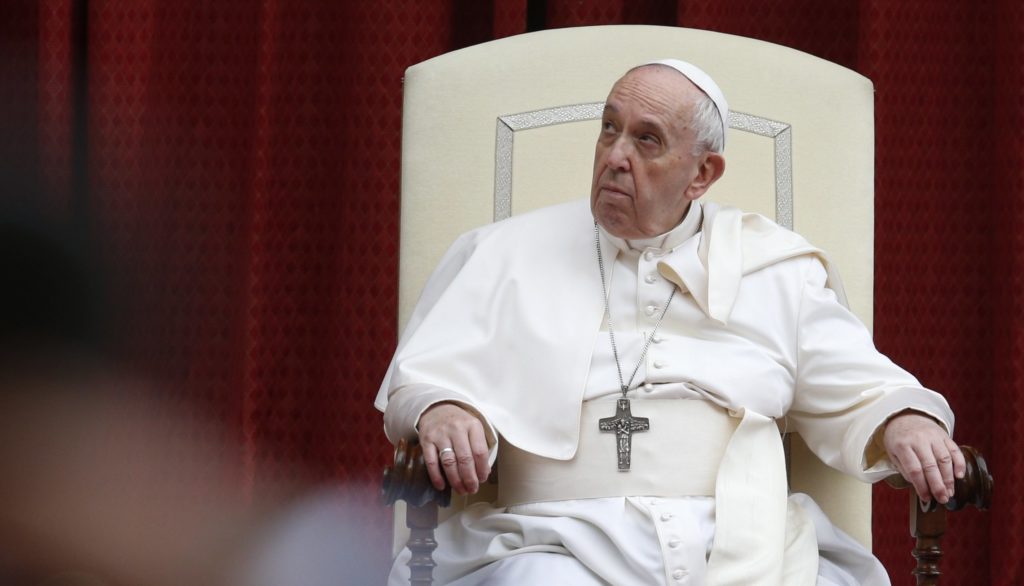Pope Francis led the catechesis on prayer, once again, at the audience on Wednesday, May 19.
On this occasion, he focused on some difficulties we encounter in prayer: "Following the lines of the Catechism, in this catechesis we refer to the lived experience of prayer, trying to show some very common difficulties, which must be identified and overcome. The first problem facing those who pray is distraction (cf. CCC, 2729). Prayer often coexists with distraction. In fact, the human mind finds it difficult to dwell for long periods of time on a single thought. We all experience this continuous whirlpool of images and illusions in perennial movement, which accompanies us even during sleep. And we all know that it is not good to follow this disordered inclination".
"The struggle to conquer and maintain concentration is not only about prayer. If one does not reach a sufficient degree of concentration, one cannot study with profit, nor can one work well. Athletes know that competitions are won not only with physical training but also mental discipline: above all with the ability to be concentrated and to keep one's attention awake."
Francis assured that "distractions are not to blame, but they must be combated." "In the patrimony of our faith there is a virtue that is often forgotten, but which is very present in the Gospel. It is called 'vigilance. The Catechism cites it explicitly in its instruction on prayer (cf. n. 2730). Jesus often reminds the disciples of the duty of a sober life, guided by the thought that sooner or later He will return, like a bridegroom at a wedding or a master on a journey. But knowing neither the day nor the hour of His return, all the minutes of our life are precious and must not be wasted with distractions. In an instant that we do not know, the voice of our Lord will resound: on that day, blessed are the servants whom He finds laborious, still focused on what really matters. They have not been scattered following all the attractions that came to their minds, but have tried to walk the right path, doing their work well."
On the other hand, the Holy Father continued, there is "the time of aridity," which deserves another discourse. "The Catechism describes it this way: "The heart is detached, with no taste for thoughts, memories and feelings, even spiritual ones. It is the moment when faith is at its purest, the faith that stands firm beside Jesus in his agony and at the tomb" (n. 2731). Often we do not know what are the reasons for aridity: it can depend on ourselves, but also on God, who allows certain situations of the exterior or interior life. Spiritual masters describe the experience of faith as a continuous alternation of times of consolation and times of desolation; moments in which everything is easy, while others are marked by a great heaviness.
Another difficulty we can encounter is "acedia, which is a real temptation against prayer and, more generally, against the Christian life. Acedia is "a form of asperity or unpleasantness due to laziness, laxity in asceticism, carelessness in vigilance, negligence of heart" (CCC, 2733). It is one of the seven "deadly sins" because, nourished by presumption, it can lead to the death of the soul".
"So," the Pope asks, "what should we do in this succession of enthusiasm and despondency? We must learn to walk always. True progress in the spiritual life does not consist in multiplying ecstasies, but in being able to persevere in difficult times. We remember the parable of St. Francis about the perfect leticia: it is not in the infinite fortunes rained down from Heaven that the ability of a friar is measured, but in walking with constancy, even when one is not recognized, even when one is mistreated, even when everything has lost the flavor of the beginnings. All the saints have passed through this "dark valley" and let us not be scandalized if, reading their diaries, we hear the story of nights of apathetic prayer, lived without taste. We must learn to say: "Even if you, my God, seem to do everything to make me stop believing in you, I nevertheless continue to pray to you". Believers never turn off prayer! It can sometimes resemble that of Job, who does not accept that God treats him unjustly, protests and calls him to judgment.
Finally, the Pope reminds us that "we, who are much less holy and patient than Job, know that finally, at the end of this time of desolation, in which we have raised to Heaven mute cries and many 'why', God will answer us. And also our hardest and most bitter expressions, He will pick them up with the love of a father, and will consider them as an act of faith, as a prayer".









